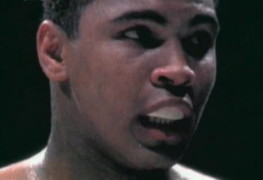Being too young (unfortunately) to have seen the great – The Greatest – Muhammad Ali fight live, even on TV, the first indelible memory I have of the immortal legend occurred twenty years ago today. Ali, by this time ravaged by Parkinson’s, quite simply made around half the world’s population shed a tear as he bravely forced his almost uncontrollable arms to assist him in accepting one of the finest honours that can be bestowed upon any athlete: that of lighting the Olympic Torch in the opening ceremony of the planet’s most-watched sporting celebration.
And Ali, in Atlanta this very day, July 19th, in 1996, stepped out of the shadows – his appearance kept a top-secret affair (this before the internet, where seemingly nothing is beyond being leaked) – and took the torch with his quivering right hand and somehow managed to see the job through, with untold thousands watching him in person and many, many millions watching on TV around the globe, light the Olympic flame.
Ali has of course enjoyed many iconic moments, moments where, if you were old enough at the time, you remember to this day where you were and what you were doing at the time. Nobody was expecting to see Ali, then aged 54 and rarely appearing on live television due to his quite horrific condition, in Atlanta, at The Games, that day. And it almost didn’t happen.
According to an piece in Rolling Stone, the head of the Atlanta committee for the 1996 Games, Dick Payne, did not want Ali to light the torch. Payne preferred the honour to go to another great heavyweight in Evander Holyfield (who was still active at the time and did run, along with athlete Janet Evans, with the Torch during the opening ceremony).
“Where we’re from, he’s perceived as a draft dodger,” Payne reportedly said of Ali.
Only the efforts of NBC executive Dick Ebersol – who argued how Ali was not a draft dodger; how he had not fled to Canada at the time of his refusal to go to Vietnam and how he was instead “willing to stand on his principals” – saw to it that Ali was given the mighty assignment.
Amazingly, all those years after Ali took his brave stand against a war that would soon prove agonising for America, and there he was still being victimized by a small-minded individual incapable of accepting progress and of admitting the law his country passed in doing what it did to Ali was so morally wrong.
Thankfully, Ali was given the ultimate honour and he used the raw courage he showed in the ring to make sure he did not let down those people who had continued faith in him. There was Ali, resplendent, all in a white, with his Olympic t-shirt, tracksuit bottoms, socks and running shoes, taking the torch with the right hand that had put down so many of his ring opponents, and signalling how the 1996 Games were open.
It was, quite simply, a sight – an iconic one – that will never be forgotten.
Of course, not everybody was moved; at least not in a joyous and celebratory manner. Ali’s fiercest ring rival, Joe Frazier, was heard to say when he was asked his opinion on Ali lighting the torch, that he felt “he should be pushed in the flames.” Bitter words, but Frazier always insisted he had a right to look at the Ali we all viewed on this day two decades ago, differently.
How beautiful it would have been if both Ali and Frazier, after shaking hands, had joined forces in lighting the torch and had both basked in the gaze of billions that sweltering evening in Atlanta.
